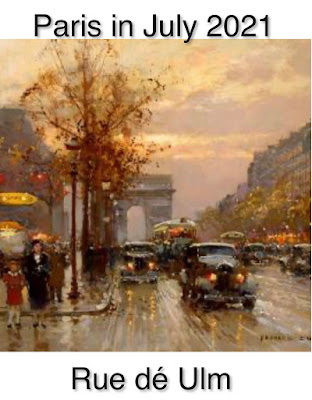“Maggie Meriwether's Rich Experience” - A Short Story set in Paris
By Jean Stafford - first published June 17, 1955 in The New Yorker
This story in included in The Library of American Edition of The Complete Stories and Other Writings of Jean Stafford
This is part of my participation in Paris in July - 2021- hosted by Thyme for Tea
Works read so far for Paris in July 2021
- Lost in Paris by Elizabeth Thompson - 2021
- Loving Modigliani by Linda Lappin - 2020
- Russian Émirgé Short Stories from Bunin to Yanovsky - edited by Bryan Karetnky. 2018 - an overview
- Pancakes in Paris - Living The American Dream in France by Craig Carlson - 2016
- The Paris Apartment by Kelly Bowen- 2021
- The Paris Architect by Charles Belfoure - 2013
- “Requiem” - A short story by Gaito Gazdanov - 1960
- The Ice Swan by J’nell Ciesieski - 2021
- Two Short Stories from the 1920s by Teffi
- “Dimanche” - A Short Story by Irene Nemirovsky - 1934- translated by Bridget Patterson 2015
- “The Life of Madame Duclos” -1927- A Short Story by IRINA ODOEVTSEVA
Jean Stafford
Born - July 1, 1915 - Covina, California
Married 1940 to 1948 to Robert Lowell . One of three marriages.
She published three novels but most now regarded for her wonderful short stories, most of which were published in The New Yorker or The Psrtisian Review as her Glory.
1970 - Pulitzer Prize for Fiction
Died - March 26, 1979 - White Plains, New York
A few days ago i was very kindly given a copy of Library of American Edition of The Complete Stories and Other Writings of Jean Stafford. I was delighted to discover that The lead story in her first collection, Innocents Abroad, “Maggie Meriwether’s Rich Experience” is about a young woman from Tennessee first trip to Paris. Stafford acknowledged a literary debt to Henry James and Edith Wharton as one can see in this wonderful story.
This story is my first venture into the work of Jean Stafford. It will, I hope, be far from my last. I was stunned by the magnificent first sentence, as I am sure the editor’s of The New Yorker were:
“There was a hole so neat that it looked tailored in the dead center of the large round beige velours mat that had been thrown on the grass in the shade of the venerable sycamore, and through it protruded a clump of mint, so chic in its air of casualness, so piquant in its fragrance in the heat of mid-July, that Mme Floquet, a brisk Greek in middle life, suggested, speaking in French with a commandingly eccentric accent, that her host, Karl von Bubnoff, M. le Baron, had contrived it all with shears and a trowel before his Sunday guests arrived at his manorial house, Magnamont, in Chantilly.”
Now that is an opening sentence!
Paris in 1955 must have been a very powerful experience for a girl from Tennessee even if her parents could afford to send her to France by herself. She learned French so she could,she hoped.fit in.
Just when she is regretting her trip she encountered an Englishman she had met in London
“Her parents, who had had to be cajoled for a year into letting her go to Europe alone, had imagined innumerable dreadful disasters—the theft of her passport or purse, ravishment on the Orient Express, amoebic dysentery, abduction into East Berlin—but it had never occurred to them that their high-spirited, self-confident, happy daughter would be bamboozled into muteness by the language of France. Her itinerary provided for two weeks in Paris, and she had suffered through one week of it when, like an angel from heaven, an Englishman called Tippy Akenside showed up at her hotel at the day of the Baron’s party”.
Tippy offers to escort her to party, He knows the Baron and assured her everyone at the party Will speak English. Of course it turns out no one does.
“Tippy introduced them he had smiled in the friendliest possible way and had said, in English, “How nice of you to come,” but then, when rotten Tippy said, “Miss Weriwether is the American girl I told you about on the phone,” the Baron thereafter addressed her in highly idiomatic French until, encountering nothing but silence and the headshakes and cryptic groans that escaped her involuntarily, he began to pretend, as the others had done from the start, that she wasn’t there.”
The rest of The story, full of so many besutiful sentences, is kind of a satire of French post war gentility.or maybe a parody of how Americans saw the French.
Mel u
The Reading Life.





















